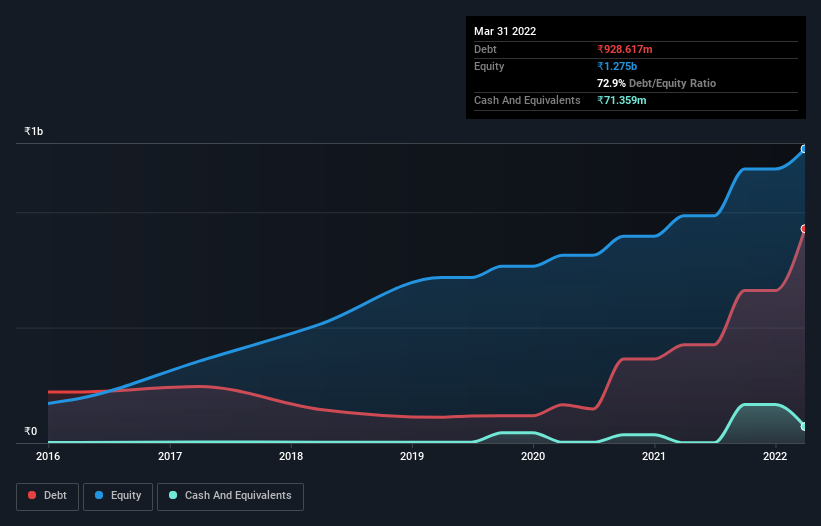Sakar Healthcare (NSE:SAKAR) Has A Somewhat Strained Balance Sheet
Warren Buffett famously said, 'Volatility is far from synonymous with risk.' When we think about how risky a company is, we always like to look at its use of debt, since debt overload can lead to ruin. As with many other companies Sakar Healthcare Limited (NSE:SAKAR) makes use of debt. But should shareholders be worried about its use of debt?
When Is Debt A Problem?
Generally speaking, debt only becomes a real problem when a company can't easily pay it off, either by raising capital or with its own cash flow. Ultimately, if the company can't fulfill its legal obligations to repay debt, shareholders could walk away with nothing. While that is not too common, we often do see indebted companies permanently diluting shareholders because lenders force them to raise capital at a distressed price. Of course, plenty of companies use debt to fund growth, without any negative consequences. The first thing to do when considering how much debt a business uses is to look at its cash and debt together.
Check out our latest analysis for Sakar Healthcare
How Much Debt Does Sakar Healthcare Carry?
As you can see below, at the end of March 2022, Sakar Healthcare had ₹928.6m of debt, up from ₹426.0m a year ago. Click the image for more detail. On the flip side, it has ₹71.4m in cash leading to net debt of about ₹857.3m.

How Strong Is Sakar Healthcare's Balance Sheet?
We can see from the most recent balance sheet that Sakar Healthcare had liabilities of ₹467.6m falling due within a year, and liabilities of ₹935.4m due beyond that. Offsetting this, it had ₹71.4m in cash and ₹287.1m in receivables that were due within 12 months. So its liabilities total ₹1.04b more than the combination of its cash and short-term receivables.
While this might seem like a lot, it is not so bad since Sakar Healthcare has a market capitalization of ₹2.97b, and so it could probably strengthen its balance sheet by raising capital if it needed to. But it's clear that we should definitely closely examine whether it can manage its debt without dilution.
In order to size up a company's debt relative to its earnings, we calculate its net debt divided by its earnings before interest, tax, depreciation, and amortization (EBITDA) and its earnings before interest and tax (EBIT) divided by its interest expense (its interest cover). This way, we consider both the absolute quantum of the debt, as well as the interest rates paid on it.
Sakar Healthcare has a debt to EBITDA ratio of 2.9 and its EBIT covered its interest expense 6.8 times. This suggests that while the debt levels are significant, we'd stop short of calling them problematic. Also relevant is that Sakar Healthcare has grown its EBIT by a very respectable 30% in the last year, thus enhancing its ability to pay down debt. When analysing debt levels, the balance sheet is the obvious place to start. But you can't view debt in total isolation; since Sakar Healthcare will need earnings to service that debt. So when considering debt, it's definitely worth looking at the earnings trend. Click here for an interactive snapshot.
Finally, while the tax-man may adore accounting profits, lenders only accept cold hard cash. So we always check how much of that EBIT is translated into free cash flow. During the last three years, Sakar Healthcare burned a lot of cash. While that may be a result of expenditure for growth, it does make the debt far more risky.
Our View
Sakar Healthcare's conversion of EBIT to free cash flow was a real negative on this analysis, although the other factors we considered cast it in a significantly better light. In particular, its EBIT growth rate was re-invigorating. We think that Sakar Healthcare's debt does make it a bit risky, after considering the aforementioned data points together. Not all risk is bad, as it can boost share price returns if it pays off, but this debt risk is worth keeping in mind. When analysing debt levels, the balance sheet is the obvious place to start. However, not all investment risk resides within the balance sheet - far from it. For example, we've discovered 4 warning signs for Sakar Healthcare (1 is a bit unpleasant!) that you should be aware of before investing here.
Of course, if you're the type of investor who prefers buying stocks without the burden of debt, then don't hesitate to discover our exclusive list of net cash growth stocks, today.
New: Manage All Your Stock Portfolios in One Place
We've created the ultimate portfolio companion for stock investors, and it's free.
• Connect an unlimited number of Portfolios and see your total in one currency
• Be alerted to new Warning Signs or Risks via email or mobile
• Track the Fair Value of your stocks
Have feedback on this article? Concerned about the content? Get in touch with us directly. Alternatively, email editorial-team (at) simplywallst.com.
This article by Simply Wall St is general in nature. We provide commentary based on historical data and analyst forecasts only using an unbiased methodology and our articles are not intended to be financial advice. It does not constitute a recommendation to buy or sell any stock, and does not take account of your objectives, or your financial situation. We aim to bring you long-term focused analysis driven by fundamental data. Note that our analysis may not factor in the latest price-sensitive company announcements or qualitative material. Simply Wall St has no position in any stocks mentioned.
About NSEI:SAKAR
Sakar Healthcare
Research, develops, manufactures, and sells pharmaceutical products in India.
Solid track record with excellent balance sheet.
Similar Companies
Market Insights
Community Narratives




